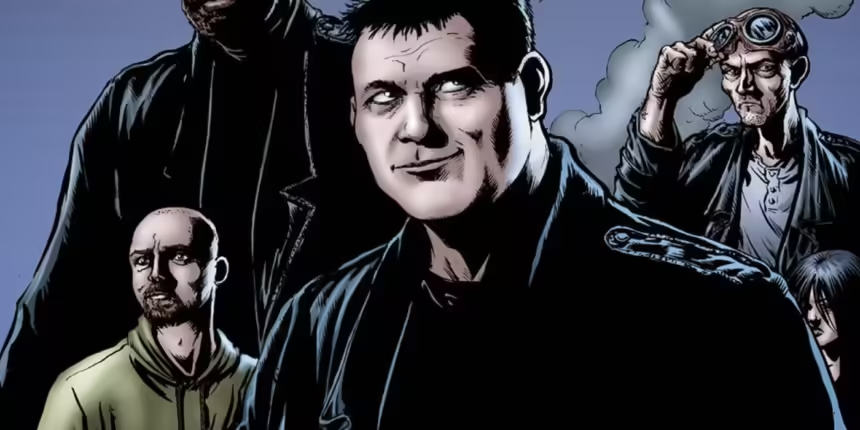The Boys comic series, written by Garth Ennis and illustrated by Darick Robertson, is a brutal and satirical take on the superhero genre. While the focus of the story often revolves around its larger-than-life characters—like Billy Butcher, Hughie, and the supes—the supporting characters also play pivotal roles in shaping the world and the personal lives of the main protagonists. One such character, albeit a minor one, is Hughie’s landlord. Though he may not appear in many scenes, his role adds a layer of realism and humanity to Hughie’s experiences in the often grim and violent world of The Boys.
1. Introduction to The Boys Universe
Before diving into the specifics of Hughie’s landlord, it’s important to contextualize the world of The Boys. The comic, known for its irreverence and graphic content, follows a group of vigilantes who monitor and occasionally take down corrupt superheroes. These “supes” have immense power but often lack moral scruples, leading to chaos and destruction. In this universe, Hughie Campbell, a soft-spoken, kind-hearted man, is pulled into this conflict after his girlfriend is tragically killed by a reckless superhero. This event sets Hughie on a path of vengeance and justice, ultimately joining the team known as The Boys.
Hughie, despite his involvement with this dangerous world, remains a grounded character. His interactions with everyday people—including his landlord—serve as a stark contrast to the high-octane, violent experiences he faces with The Boys. Hughie’s landlord, though a minor character, becomes a part of this tapestry, adding nuance to Hughie’s personal life.
2. Hughie’s Landlord: The Role of Normalcy
Hughie’s landlord is not a key player in the grand scheme of The Boys’ plot. He doesn’t have superpowers, nor does he get involved in any of the bloodthirsty conflicts between The Boys and the supes. However, this character embodies a piece of Hughie’s pre-The Boys existence—a life before tragedy struck and he was drawn into the moral grey area of Butcher’s crusade against superheroes.
In many scenes, Hughie’s interactions with his landlord revolve around typical tenant-landlord exchanges. Issues like late rent, apartment maintenance, and mundane complaints offer a momentary respite from the chaos of his life with The Boys. These interactions help ground Hughie, reminding readers that despite the supernatural and violent world he is thrust into, he still has to deal with regular problems like anyone else. His landlord, though seemingly insignificant, represents a normality that Hughie clings to.
The landlord can be seen as a representation of how Hughie is torn between two worlds. On one hand, he has the civilian, everyday life where his biggest problems should be paying rent on time or dealing with a leaky faucet. On the other hand, he is embroiled in a violent and morally complex war against the supes, where life and death hang in the balance. The presence of his landlord acts as a reminder of the life he could return to if he were to walk away from The Boys.
3. The Personality and Dynamic Between Hughie and His Landlord
While not much is detailed about the landlord’s background or personality, his interactions with Hughie provide insight into their dynamic. The landlord tends to be strict and focused on his responsibilities. He reminds Hughie about rent deadlines and seems somewhat indifferent to his tenant’s personal struggles, which makes sense given the landlord’s professional relationship with Hughie.
This dynamic between them helps show how detached Hughie has become from the civilian world. Even though his landlord might offer small glimpses of normality, Hughie’s life is anything but. The landlord’s matter-of-fact nature contrasts sharply with the emotional and psychological turmoil Hughie endures due to his experiences with The Boys. In this way, the landlord serves as an unwitting reminder of how disconnected Hughie has become from ordinary life.
4. Symbolic Role in the Comic
While the landlord’s role is small, his inclusion in the narrative isn’t without purpose. In many ways, the landlord represents an anchor to the regular, human world—one that Hughie is constantly on the verge of losing. In the midst of The Boys, where violence, corruption, and moral ambiguity reign, the landlord is a touchstone of reality. When Hughie returns to his apartment and interacts with his landlord, it’s a reminder to both him and the readers that there is still a “normal” world out there, even if it feels increasingly distant for Hughie.
The landlord’s recurring appearance throughout the series, albeit in the background, is a subtle yet poignant nod to the duality of Hughie’s existence. On one side, he’s dealing with unspeakable horrors, violent deaths, and ethical quandaries. On the other, he’s still just a guy who rents an apartment and has to deal with the day-to-day struggles of ordinary life. In this sense, the landlord serves a symbolic role, showing that no matter how deep Hughie is drawn into the dark, twisted world of The Boys, he still has a foot in the mundane.
5. Thematic Contrast with Other Characters
The inclusion of ordinary characters like Hughie’s landlord is a deliberate choice by Garth Ennis to contrast the world of The Boys with the grounded, human realities that the characters struggle to maintain. Hughie’s landlord stands as a stark juxtaposition to the otherworldly, godlike supes, highlighting the chasm between those with power and those without.
While the supes are untouchable, celebrity-like figures who cause destruction and bend the world to their will, the landlord represents those who are left to pick up the pieces and continue living in this broken system. In this way, the landlord’s small role is a critical reminder of the ordinary individuals who live under the shadows of the supes’ chaotic world.
6. Conclusion: The Importance of Hughie’s Landlord in The Boys
Though Hughie’s landlord may seem like a minor, almost forgettable character, he plays a crucial role in maintaining the thematic balance of The Boys comic. He represents a part of Hughie’s life that is still untouched by violence and chaos—a reminder that the “normal” world still exists, even as Hughie becomes more entrenched in The Boys’ dark crusade against the supes. His character, though subtle, is an essential element in illustrating the contrast between Hughie’s tumultuous life with The Boys and the ordinary struggles of day-to-day living.
Ultimately, Hughie’s landlord serves as a small but significant part of the broader narrative, offering readers a glimpse into the personal side of Hughie’s world and reminding us of the fine line that separates normality from chaos in The Boys’ universe.







